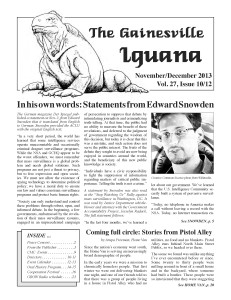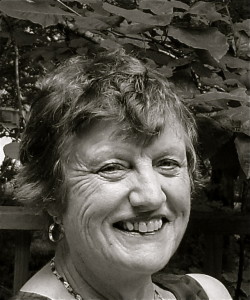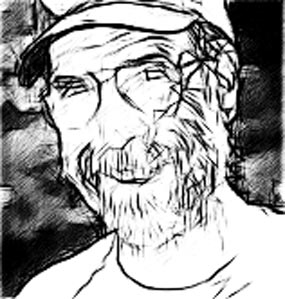 Can’t get into town for the print Iguana? Or did you make it to the box a little late this month?
Can’t get into town for the print Iguana? Or did you make it to the box a little late this month?
Well, don’t worry! We have the whole November/December 2013 issue here for your perusal.
 Can’t get into town for the print Iguana? Or did you make it to the box a little late this month?
Can’t get into town for the print Iguana? Or did you make it to the box a little late this month?
Well, don’t worry! We have the whole November/December 2013 issue here for your perusal.
Posted in Articles, November-December 2013
For 25 years, the Alachua Conservation Trust (ACT) has been working to protect the natural, historic, scenic and recreational resources of north central Florida. ACT’s silver anniversary is now highlighted with its selection by the Land Trust Alliance from among more than 1,700 land trusts across the country to receive its National Land Trust Excellence Award.
The award was presented at Rally 2013: The National Land Conservation Conference in New Orleans, Louisiana, on September 17, 2013. It is the highest award a land trust can receive and its equivalent to winning the national championship in a respective college sport.
ACT is the first land trust from Florida to receive the award. The award is a reflection of the years of dedication, creativeness and perseverance of our talented staff, board members, volunteers, partners and generous supporters that allow us to carry out our mission of protecting Florida’s natural and scenic places each day. ACT has benefited tremendously, in particular, from the leadership, energy and ingenuity of its past executive directors Robert ‘Hutch’ Hutchinson and Lauren Day.
Posted in Articles, November-December 2013
After months of anticipation, and a lot of waiting for other entities to pick up the ball and run with it, the return to Gainesville of Noam Chomsky went forward at the Curtis M. Phillips Center for Performing Arts on Tuesday evening, Oct. 15. With the Civic Media Center as the presenter of the event, it meant a lot of very short notice fundraising had to take place to secure the Phillips Center and to cover the travel and other expenses to make it happen. It is with great thanks that the Civic Media Center thanks Alachua Conservation Trust, Veterans for Peace, National Women’s Liberation, Graduate Assistants United, Alachua County Labor Party, Samuel Proctor Oral History Project, Sweetwater Branch Inn, Alta Systems, Target Copy for printing the programs, and all the other individuals and groups who jumped on board at short notice for making the event happen. Expenses were covered, but any gift/donations/memberships to the CMC would be greatly appreciated to help mark the CMC’s 20th anniversary.
Posted in Articles, November-December 2013
 by Paul Doughty
by Paul DoughtyHelen Icken Safa, died November 4, 2013 at Haven Hospice in Gainesville. She was well-known to the academic community in the U.S. and Latin America having been Director of Latin American Studies at the University of Florida and Professor emerita of Anthropology, positions which she assumed in 1980. She was born in New York City in 1930 and grew up there and attended Cornell University where she graduated in 1952. She then pursued a doctorate at Columbia University in Anthropology and began specializing in the study of Caribbean societies, particularly Puerto Rico where she completed her doctoral research, later published as The Urban Poor of Puerto Rico. In 1962 she married Manoucher Safa-Isfahani, an Iranian who worked for the United Nations Secretariat in New York and who died in 1995. Upon finishing her doctorate Helen taught at Syracuse University and then at Rutgers University from 1967–1980 serving as Chair of the Anthropology departments and was also director of Latin American studies. In 1980 she came to the University of Florida, retiring in 1997.
Posted in Articles, November-December 2013
The Samuel Proctor Oral History Program premiered its latest documentary Siempre Adelante: A Look at Faith and the Immigrant Struggle to a full house on Oct. 1. The film, created and compiled by UF students and faculty, follows the stories of four “illegal” immigrants on their journey from the Global South to Alachua County and into labor exploitation. Their anonymous stories are personal to Gainesville citizens because they’re local: new U.S. workers and their oppressors live here and pass by us every day.
Filmmakers Deborah Hendrix and Maria Munoz recast the immigrants not as victims but as survivors, defying marginalization as undocumented workers creatively and courageously. “Nelson” spoke about a battle with the man who brought him to Florida from Guatemala: “And then he started to blackmail me, saying he was going to turn me over to Immigration and give them my address. Okay, that’s fine, I said to him. Do it, so then if Immigration comes to my house and starts asking questions, I’ll tell them that you brought me here.”
Posted in Articles, November-December 2013
This is the eighteenth in a continuing series of transcript excerpts from the collection of the Samuel Proctor Oral History Program at the University of Florida.
Allen Cooper was interviewed by Steve Davis in 2008.
My part in the Movement started in 1959 when I came out of the Navy. I was on an aircraft carrier. I’m a combat veteran, and I came out with an emerging consciousness that was shaped, in part, by the Navy itself. I had never met any people of color. I met a Comanche Indian and a black guy from New York and they treated me kindly. They could see how innocent and untested and untried I was, and when I asked them questions they treated me seriously. …
I was going to be an Episcopal priest, and I decided to go into the Navy first, and I’m glad I did. I discovered the hypocrisy of institutionalized religion, and I was looking for a whole lot of stuff I didn’t know about and I knew I didn’t know. … I just realized that there was a whole lot of world out there that I didn’t know about, and that I wanted to know. I started getting conscious of racism in the Navy because I was hanging out with an Indian guy and a black guy, and I saw some of the beginnings of racism and I didn’t like it.
Posted in Articles, November-December 2013
 by Joe Courter
by Joe CourterA number of years ago, I had a conversation with a fellow of very different point of view than me. It was at the City of Alachua’s July 4 celebration, and he was with a Veterans organization that had a table at the event. When I mentioned I was looking for the Veterans for Peace table, he began disparaging them, and by connection, me. In pursuing a conversation away from the table, he proceeded to give me a window into his worldview. He firmly believed the USA was the dominant nation in the world, and it needed to stay that way. That the USA was right to overthrow the elected governments of Iran (1953) and Chile (1973) because it was in the USA’s interests. Obtain the oil that is under other country’s land? Hell yeah. The USA’s interests trump anything, because “we” must be the leader in the world, and anything less than that he was opposed to.
This gentleman’s “We’re number One!” wasn’t just jingoistic rhetoric; it was heartfelt belief, and I think about it now because I wonder if we are seeing circumstances where the world is getting ready to move on, and not just do as the U.S. says anymore. The dirty truths revealed about our county’s behavior in the last decades are resonating world wide, and more and more people around the world are questioning our motives. Is this most powerful military a force that is making the world better, or acting in its own interests? Is our monitoring of global communications a thing to tolerate? Is the U.S. economy a stable foundation for world currency markets? Is this country’s government itself stable, what with the government shutdown and gridlocked bickering?
Posted in Articles, November-December 2013
There is a growing movement in Florida to advocate for in- state tuition for foreign-born students who have graduated from Florida high schools and meet Florida residency requirements.
At Santa Fe College in Gainesville, for example, a three-credit course at an in-state tuition rate costs $307 versus $1,144.80 out-of-state. That is a 268 percent increase, making college unaffordable for these students. I, along with immigrant advocates, have met with the president of Santa Fe College, but the college and the University of Florida refuse to offer in-state tuition claiming erroneously that federal and state laws prohibit them from doing so.
Only two public colleges in Florida (Miami Dade and FIU) currently offer out-of-state tuition waivers (basically in-state tuition) to some of these students who have obtained DACA (Deferred Action for Childhood Arrivals) cards allowing them to legally work and not fear deportation.
Posted in Articles, November-December 2013
This year, the 27th annual Veterans for Peace Winter Solstice Peace Concert will be on December 21 at 8 pm at the Unitarian Universalist Fellowship of Gainesville (4225 N.W. 34th Street, Gainesville, FL 32605-1422).
The doors open at 6:30 P.M. and the concert begins at 8:00 P.M., but people who purchase tickets in advance must arrive by 7:30 P.M. to assure a seat. Unclaimed seats will be opened up for those in line after 7:30 P.M., with no preference given to advance ticket purchasers, until all 400 seats are filled.
The event will feature music from Cherokee Peace Chant, Drums of Peace, John Chambers and Friends, Lauren Robinson & Marissa Vario, Quartermoon, Other Voices, The Erasables, The (formerly psychedelic) Relics, and Heavenly Semi-Angels.
Posted in Articles, November-December 2013
Since the nation’s economy went south, the Home Van is serving an increasingly broad demographic of people.
In the early years we were a mission to chronically homeless people. That first winter we were out delivering blankets one night, and one of our friends told us that there was a group of people living in a house in Pistol Alley who had no utilities, no food and no blankets. Pistol Alley runs behind North Main Street Publix, so we headed over there.
The scene we found was unlike anything I’ve ever encountered before or since. Some twenty to thirty people were milling around in front of a small house and in the backyard, where someone had built a bonfire. These people were so intoxicated that they were staggering in blind circles, some babbling and some screaming. Their eyes were entirely blank—no one home behind those eyes—their souls in hiding.
Posted in Articles, November-December 2013